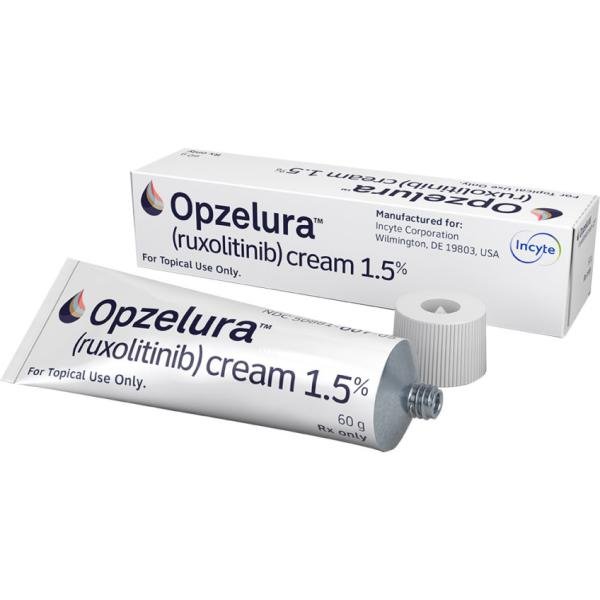Ruxolitinib topical and Alcohol/Food Interactions
There is 1 alcohol/food/lifestyle interaction with ruxolitinib topical.
Ruxolitinib Topical Food/Lifestyle
Major Food Interaction
Consumer information for this interaction is not currently available.
MONITOR CLOSELY: Smoking during treatment with topical ruxolitinib may increase the risk of major adverse cardiovascular events (MACE) and the risk of developing malignancies, including lymphomas. During clinical trials, patients who were current or past smokers and received oral Janus Kinase (JAK) inhibitors to treat inflammatory conditions had an additional increased risk of overall malignancies. Additionally, oral JAK inhibitors reportedly increase patients' risk of MACE, including cardiovascular death, myocardial infarction, and stroke, particularly in patients who are current or past smokers or patients with other cardiovascular risk factors.
MANAGEMENT: The potential risks and benefits of topical ruxolitinib should be carefully weighed prior to initiating therapy, particularly in patients with cardiovascular risk factors, as well as those with a history of malignancy, those who develop a malignancy while on treatment, and/or patients who are current or past smokers. Patients should be informed about the symptoms of serious cardiovascular events and the steps to take if they occur. The manufacturer recommends discontinuing topical ruxolitinib in patients who have experienced a myocardial infarction or stroke.
Switch to professional interaction data
Ruxolitinib topical drug interactions
There are 339 drug interactions with ruxolitinib topical.
More about ruxolitinib topical
- ruxolitinib topical consumer information
- Check interactions
- Compare alternatives
- Reviews (6)
- Side effects
- Dosage information
- During pregnancy
- Drug class: topical antineoplastics
- Breastfeeding
- En español
Related treatment guides
Drug Interaction Classification
| Highly clinically significant. Avoid combinations; the risk of the interaction outweighs the benefit. | |
| Moderately clinically significant. Usually avoid combinations; use it only under special circumstances. | |
| Minimally clinically significant. Minimize risk; assess risk and consider an alternative drug, take steps to circumvent the interaction risk and/or institute a monitoring plan. | |
| No interaction information available. |
See also:
Further information
Always consult your healthcare provider to ensure the information displayed on this page applies to your personal circumstances.


